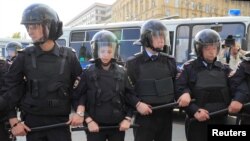Anti-government protesters in Russia are increasingly relying on an encrypted and officially banned messaging app to pass on information in critical situations, from dodging riot police to giving those arrested a line to the outside.
Although officially banned in Russia, Telegram is still running, and experts say it's harder to hijack than other popular platforms.
Since July, Moscow has been rocked by almost weekly rallies after a dozen independent candidates were blocked from running for the city legislature in Sunday's election. Authorities responded with a harsh police crackdown, arresting hundreds.
Russia banned Telegram after its creators refused to hand over the encryption keys to authorities last year. Nevertheless, it remains available and many pro-government figures and Kremlin officials, including President Vladimir Putin's spokesman Dmitry Peskov, still keep active accounts.
Sergey Sanovich, a postdoctoral scholar at the Center for Information Technology Policy at Princeton University, says the app is better than others at effectively coordinating protests.
“It is not designed around collecting the largest number of likes,” he said. “It is a tool for real people for offline interaction.”
Protesters have harnessed Telegram's tools, from information channels to chats and automated bots, to streamline communication, create aid initiatives for detainees and render civil activity more effective.
If someone wants to join the grass-roots, protest group Bessrochka, for example, the group's website instructs users to join a “protest navigator” on Telegram. The navigator then provides new users with a list of channels which offer a steady flow of information about the latest opposition activity or political topic, and chats which link new recruits with other activists in their area.
Protesters have also been using Telegram bots to provide legal assistance, food or financial aid for detainees.
That is one of the ways police monitoring group OVD-Info has managed the onslaught of panicked messages from those detained at each weekend rally. Automated bots optimized a system overwhelmed by alerts, making sure that no one slips through the net and allowing the group to make a more accurate count of detainees.
Russian opposition leader Alexey Navalny on Monday launched a bot to help users navigate his Smart Vote initiative, a tactic the opposition is hoping will break the monopoly of President Vladimir Putin's United Russia Party at the Moscow City Duma elections. The bot quickly tells users which candidate to vote for according to their address.
A series of anonymous Telegram chats also helped protesters at a rally last month locate riot police and avoid arrest, with users exchanging tips about which areas had become too hot and which streets were safe.
Previously, rallies in Russia were partly coordinated through Twitter hashtags. But often large groups of automated bots would be deployed by pro-government agents to produce counter propaganda and spam, and the hashtag would quickly become unusable.
More and more protests are now coordinated on Telegram channels rather than Twitter.
“It's much harder to hijack a channel than a hashtag,” Sanovich explained.
Telegram's strengths, however, for activists are also its vulnerabilities. Its anonymity makes users' communications safer, but it also helps the authorities who can anonymously join open chats and channels and monitor the opposition's activity.
Gregory Asmolov, a Fellow at King's College London's Russia Institute, wrote in a recent essay for Open Democracy that as the Russian opposition is adopting new digital tools, the government “may soon find itself at a crossroads.”
Authorities may feel forced to use more force to block digital tools, he said, but those ``drastic measures may provoke a new spiral of protests.''




